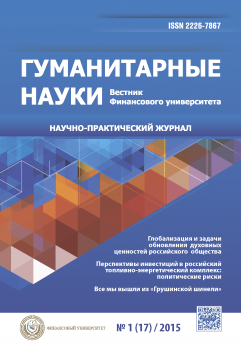The article presents the results and analysis of the sociological study on "Attitude of faculty members of universities to modern students and technology teaching". The study involved teachers from the Financial University and other universities of the city of Moscow of different age groups. The main questions of the survey questions were compared to modern students and students from twenty-thirty years ago, and the identification of the attitude of teachers to teaching the academic disciplines. Shows some trends in the attitudes of faculty members of universities to modern students. Consider the ratio of teaching staff to the topical problem of educational technology, methods of teaching; teachers ´ attitudes to the changing approaches and technologies of education in the modern University. A comparison of the classical school of teaching and modern (interactive) methods. Revealed a General trend of a positive attitude of teachers to interactive teaching methods, as well as the views of teachers, interactive teaching methods perception and memorization of learning material by students is significantly better than the classical method. Revealed the General trend of the need to present a judicious combination of classical and interactive methods of teaching disciplines in the University. The analysis of the ratio of use of elements of both classic and interactive teaching methods in their personal professional activity of teachers from different universities and different age groups. The peculiarities and tendencies discussed their views on increasing interactive lessons Revealed the opinion of the faculty on the phenomenon of lecturing skills. Highlighted are some influencing factor groups to improve lecturing skills of teachers, in particular the necessity of training courses on methods of teaching and lecturing skills.
student, teacher, educational technology, methods of teaching.
1. Annenkova N.V., Kamneva E.V., Polevaya M.V. Aktual’nye voprosy professional’noy podgotovki kadrov dlya innovatsionnoy ekonomiki [Topical issues of vocational training for the innovation economy]. Gumanitarnye nauki. Vestnik Finansovogo universiteta [Humanities. Journal of Finance University]. №2 (6). P.106-109.
2. Ivanova I.A. Innovatsionnaya obrazovatel’naya sreda kak osnova razvitiya chelovecheskogo kapitala [Innovative educational environment as a basis for the development of human capital]. Obshchestvo v epokhu peremen: formirovanie novykh sotsial’no ekonomicheskikh otnosheniy: materialy V mezhdunarodnoy nauchno-rakticheskoy konferentsii [Society in Times of Change: the formation of the new socio-economic relations of the V international scientifi c-practical conference]. Saratov, 2014. P. 94-95
3. Ivanova S.A., Rozina N.M. Sozdanie i razvitie instituta vysshego obrazovaniya v Rossii (istoriko-pravovoy aspekt) [Creation and development of the institution of higher education in Russia (historical and legal aspect)]. Gosudarstvo i pravo [State and law]. 2013. №10. P.95-102.
4. Il’inskiy I.M. Modernizatsiya rossiyskogo obrazovaniya v kontekste mirovoy globalizatsii [Modernization of the Russian education in the context of a globalizing world]. Znanie. Ponimanie. Umenie [Knowledge. Understanding. Ability]. 2012. №3. P.3-23.
5. Kabakova N.V., Korobanova Zh.V. Innovatsionnye formy i metody obucheniya v sovremennom vuze [Innovative forms and methods of training in modern university]. Formirovanie obshchekul’turnykh i professional’nykh kompetentsiy finansista Sbornik nauchnykh trudov studentov, aspirantov i prepodavateley Finansovogo universiteta pri Pravitel’stve Rossiyskoy Federatsii [Formation of common cultural and professional competences of the fi nancier. Collection of scientifi c works of students and teachers Financial University under the Government of the Russian Federation]. Moscow, 2014. P. 107-111.
6. Karina O.V., Shustova N.E., Kiseleva M.A. Problematika samodeterminatsii i ekspektatsiy lichnosti v gumanitarnykh naukakh [The issue of self-determination and identity of expectations in the humanities]. Saratov, Publishing house “Saratov power”, 2009. 77 p.
7. Lebedev A.N., Annenkova N.V., Buyanova S.M., Gagarina M.A., Kamneva E.V., Korobanova Zh.V., Krylov A.Yu., Muzhichkova Yu.E., Orlova E.A., Chizhikova E.S. Psikhologicheskie bar’ery modernizatsii rossiyskoy ekonomiki v sfere finansov [Psychological barriers to modernize the Russian economy in the sphere of fi nance]. Moscow, 2014.
8. Sitarov V.A., Shutenko A.I., Shutenko E.N. Psikhologicheskie osobennosti otsiokul’turnogo oblika studencheskoy molodezhi [Psychological features of the socio-cultural image of students]. Znanie. Ponimanie. Umenie.[Knowledge. Understanding. Ability]. 2009. №2. PP. 66-72.
9. Subocheva A.O. Sotsial’no-ekonomicheskie osnovy sovershenstvovaniya sistemy podgotovki spetsialistov po upravleniyu personalom v nalogovykh organakh: Avtoreferat dissertatsii na soiskanie uchenoy stepeni kandidata ekonomicheskikh nauk [Socio-economic bases of perfection of training system for personnel management in the tax authorities: the Abstract of the thesis for the degree of candidate of economic sciences]. Moscow, 2005.
10. Manukhina S.Yu., Chistyakova S.N. Formirovanie sotsial’no-professional’nogo samoopredeleniya molodezhi v usloviyakh nepreryvnogo obrazovaniya [Formation of the socio-professional self-determination of young people in terms of continuing education]. Moscow, 2012. 207 p.
11. Shirvanov R.A., Kamneva E.V., Annenkova N.V. Primenenie informatsionnykh tekhnologiy dlya upravleniya kompetentsiyami v protsesse obucheniya [The use of information technology to manage the competencies in the learning process]. Akmeologiya [Akmeology]. 2014. № 3-4. PP. 196-197.





